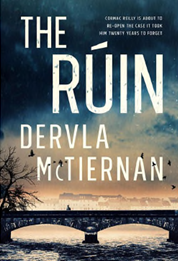The Rúin - a review
- The Beagle
- Mar 29, 2018
- 4 min read

I picked up this book in the Potts Point Bookshop in MacLeay Street in Sydney a week or so ago. The Potts Point Bookshop shares certain characteristics with most other book shops, namely that it is a haven in which to while away time but to while away that time in a manner that is profitable and leaves one with a certain sense of self-righteousness. And, of course, a book shop offers the opportunity to avail oneself of some retail therapy with the added benefit, as regular readers of my scratchings will know, that you cannot spend too much money in a book shop; you can only spend more money than you meant to. On this occasion I emerged with Miss Burma by Charmaine Craig (which I will review elsewhere), 1968: Those Were the Days by Brian Williams (they were the days, I was there) and the subject of this review, The Rúin by Dervla McTiernan. I picked up The Rúin because the blurb on the back suggested that it was set in Galway.
We flew to Ireland on Christmas Day just past to attend the wedding of Number 1 Son. His bride is a native of Adare in County Limerick so we spent a couple of weeks in Ireland; I had not been to Ireland since 1992 and I was not disappointed. It has changed little: Dublin is a lovely city; with a statue of another T Moore how could it be anything but? Dingle was seemingly unchanged apart from the welcome addition of a distillery.
We spent two nights in Galway and as a result, of course, I know all about the place. One always seems to bump into Australians when overseas, largely in the search for coffee that meets Australian standards. In William Street we found one such place and chatted to a young woman from Melbourne who was there “because it was like a Melbourne café and the coffee was as good.” It was. But none of this has a great deal to do with Dervla McTiernan’s book … except that it relates to Galway. The frontispiece to the book tells me that McTiernan practised as a lawyer for 12 years before fleeing to Western Australia where she now works for the Mental Health Commission. I am quite sure that this experience goes some way to explaining why I enjoyed this book hugely.
The Rúin can be read in at least two ways. If you ignore the accent it means something that is in a state of decay. In Gaelic, Rúin means “something hidden, a mystery, or a secret, but the word also has a long history as a term of endearment.” The book is apparently the first in a series of novels about its central figure, a likeable but thankfully flawed character called Cormac Reilly. There are two other characters, a doctor called Aisling (who I found realistic, engaging and infuriating in roughly equal measure) and Aisling’s boyfriend’s sister Maude (who I never quite trusted). If it is true that novels are in some sense autobiographical then I wonder which of the three carries the spirit of the author. Perhaps they all do. Of course, you do not need to like or respect or even understand the characters in a book to enjoy it. This one tells a ripping yarn that keeps you turning the pages.
The book opens with a prologue describing events that took place twenty years before the story proper begins. Cormac Reilly is a wet-behind-the-ears copper who is called to the crumbling house of Hilaria Blake. She is dead upstairs and her two children, Jack and Maude, are in the house with her. Twenty years later Cormac has grown up and Jack, who is by now Aisling’s boyfriend, is found dead and the police decide that he has committed suicide. Jack’s sister Maude turns up (from Australia) and decides that it is not suicide and she persuades an unwilling (or perhaps just grieving) Aisling to take on the police.
McTiernan draws Cormac Reilly as a decent chap but with some possibly serious baggage. He has moved back to Galway following his wife as she pursues her scientific career. What McTiernan does well in this novel is to paint a picture of a police operation that is entirely believable. McTiernan weaves in the scandals that have hit the Catholic Church of Ireland (as they have hit many other institutions, and not just religious ones) and that have changed Ireland so much (and probably for the better).There is little romanticism about the way she writes of the idleness, stupidity and corruption of the police. It is, unfortunately, all too believable. But this is a novel and it all comes to a conclusion.
This book is not high literature, it is unlikely to be on the reading list for a year 10 English Literature curriculum but in a way that curriculum might be the poorer for its omission. It tells an engaging story and it is well-written. I popped into Moruya Books the other day and I saw that Janice has a few copies there for sale. I expect that you will buy them all so that McTiernan’s second novel which is due in March 2019 will sell like hot cakes. While you are doing that you might checkout a piece in the Sydney Morning Herald about McTiernan headlined “How crime writer Dervla McTiernan's life changed twice in one day.” The words “remarkable’ and “woman” are frequently used together; in this case with some justification. The Rúin by Dervla McTiernan, Penguin Books, 2018, ISBN 9 780143 133 124, 400pp


